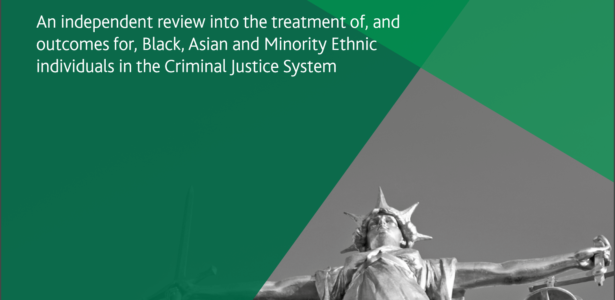Why diversity matters

The Lammy Review into the treatment of, and outcomes for black, Asian and minority ethnic (BAME) individuals in the criminal justice system once again highlighted the significant race inequalities in our justice system. Clinks held two roundtable events at both Labour and Conservative Party Conferences, supported by Barrow Cadbury Trust, to discuss the Review’s findings and recommendations. Each week an attendee at one of the roundtables will write about their reflections on the review, in the context of their own position and sphere of influence, and what they plan to do in response to it.
The Lammy Report highlights some uncomfortable truths about representation of BAME communities in criminal justice organisations, and the impact this has on trusting and positive relationships between communities, policing and the criminal justice system. Uncomfortable, because they are not necessarily unknown; uncomfortable because they emphasise the lack of progress that has been made despite that knowledge.
The reluctance of BAME community members to report issues and concerns is the sad consequence of these truths. This reluctance, stemming from the challenges they often face when they do engage with police and criminal justice organisations, serves only to further break down the relationships necessary to ensure the public approval of and co-operation with policing and justice, let alone its impartiality.
Interaction with the police is often the very beginning of a person’s contact with the criminal justice system, indeed anecdotal evidence suggests that most people conflate all criminal justice organisations with the police. This demonstrates the importance of getting relationships between BAME communities and police right; after all, you only get one chance to make a first impression. As the Lammy Report confirms, a major factor in whether BAME communities feel confident engaging with policing and criminal justice is the degree to which they feel represented and accepted. If they don’t feel confident, then they are unlikely to trust justice organisations.
Increasing the visibility of BAME within policing and particularly among police officers, is essential if we want communities to engage with a system which is not only representative, but as a result is more understanding of their needs. Why does that matter? It matters because those people and communities will then be treated fairly throughout their journey through the bureaucracy and complexity of criminal justice.
But we don’t need to stop at the theoretical. In 2015, North Yorkshire Police (NYP) was highlighted as one of four forces across the country with no black police officers, leading Mrs May as the then Home Secretary to state that the figures provided clear direction for improvement and for PCCs to hold chief constables to account.
Just last week, North Yorkshire was held up again for not recruiting BAME people as police officers, remaining the only force in the country to fail to do so. This prompted Baroness Williams to state that diversity in policing is not ‘nice to have’ but ‘an operational necessity’. I agree with her. In North Yorkshire, the police service does not currently represent our communities well enough and the implications of that are laid bare in the Lammy Review.
The case for urgent action in policing in North Yorkshire is clear and I genuinely think we are on that journey, but there are no shortcuts. We are working to understand the issues which underlie our poor performance, to learn lessons and to work with BAME communities to implement solutions which are meaningful and long-lived.
As part of an increasingly ambitious recruitment programme, NYP recently held a recruitment event for a diverse group of potential BAME applicants. In his address to attendees, the Chief Constable stated that NYP have failed BAME communities in North Yorkshire. It is good that we are not shying away from the challenge we face.
Quite rightly, NYP are working with individual BAME applicants to support them through the application process, and tracking applications from those who declare BAME backgrounds to ensure the reasons for unsuccessful applications are examined and understood. As an example, NYP worked closely with a Special Constable recruit from Craven who passed all stages of selection but then failed to pass his fitness exam. As a consequence of a lack of positive action in this case, he was not successful and the negative feedback I know he gave to his local community has the potential of being damaging to relationships between NYP and BAME communities in Craven in the longer term, particularly with respect to their likelihood of applying to join NYP.
It is crucial that we pay greater attention to precisely these kinds of first-hand experiences of North Yorkshire’s residents because they will help us to learn from the experiences of BAME applicants to any role in policing, and understand the impact that has on them and their communities.
I continue to take the lead on developing closer links and forming strong, understanding relationships with BAME communities in North Yorkshire. I have undertaken a series of visits to religious groups in North Yorkshire and I will continue to engage with community groups across North Yorkshire to learn and to better understand what they need from policing and from criminal justice services in North Yorkshire.
At one of my meetings, a group of women told me how they no longer travelled by bus because of the abuse they received. They also told me that they wouldn’t report issues to “white officers” because those officers simply wouldn’t understand them. The relationship those women had with NYP is just one example of the things we need to work harder to change and again relies on understanding first-hand experiences.
In addition to the work we need to do to understand and improve relationships between communities and NYP, we also need to improve the experiences of BAME individuals in any role within NYP. As part of that work, I am also leading on increasing our understanding of the needs and experiences of BAME individuals within policing in North Yorkshire through a research project which will draw on the lived experiences of force personnel in focus group discussions of the issues and culture that we need to change.
These efforts are a step as we continue along a difficult road but nonetheless, progress in increasing visible representation and developing our understanding of the challenges BAME applicants and staff within NYP face remains slow. In the Police and Crime plan for North Yorkshire, reinforcing local policing and enhancing the customer experience are two of my four priorities and I believe that increasing diversity within policing through recruitment and retention are fundamental to success.
The key will be joining with BAME communities to make that happen. At the end of the day, NYP cannot be an exemplary police service, or provide good customer service when it counts to those in contact with the criminal justice system, unless they represent the communities they police.
